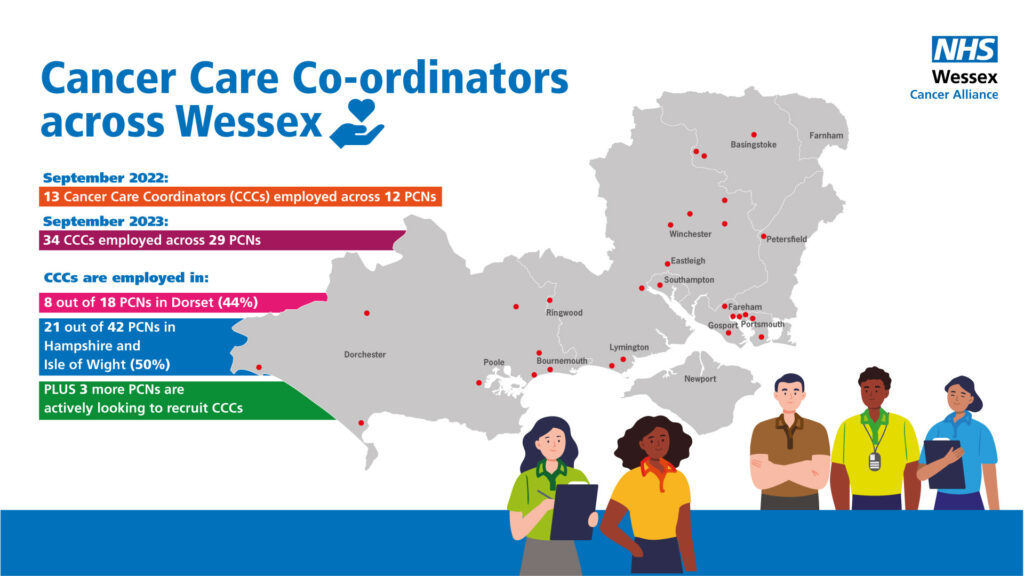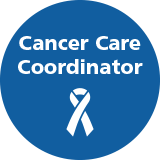Care coordinators provide extra time, capacity, and expertise to support patients in preparing for clinical conversations or in following up discussions with primary care professionals. They work closely with the GPs and other primary care colleagues within the primary care network (PCN) to identify and manage a caseload of identified patients, making sure that appropriate support is made available to them and their carers (if appropriate), and ensuring that their changing needs are addressed. They focus on the delivery of personalised care to reflect local PCN priorities, health inequalities or at risk groups of patients.
The Care Coordinators role requirements stated in the Network DES Contract can help to deliver many of the objectives expected of Primary Care for Cancer patients. In addition, they can help reduce workload for other members of the team with arranging appointments and following up patients and referrals. They can be utilised across the cancer pathway from prevention to End of Life. Their role can help drive up screening numbers, tackle inequalities and support patients.
Consistent employment of cancer care coordinators across all PCNs will also enable co-ordination across sectors as growing knowledge of this role will enable easy access to the primary care MDT.
A cancer care coordinator can support the following:
Prevention:
- Identify at risk populations through QoF Register: including obesity and smoking.
- Lead on advertising preventative advice within surgeries, social media and websites
- Signpost to services
- Coding
Screening:
- Identify low screening rates, non-responders, low participation groups
- Make contact to provide information and support to encourage uptake
Safety Netting:
- Arranging follow-up GP appointments, providing information and leaflets to patients.
- Follow up patient groups that may not attend appointments.
- Monitor completion of FiT
- Audit PCN Safety Netting process
Early Diagnosis
- Promote use of digital tools to aid decision making and safety netting
- Monitor fast track urgent suspected cancer referral and escalate breaches.
- Care Navigation
Personalised Care
- Coordinate care for anyone diagnosed with cancer in the practice signposting to internal and external services at any point in the pathway
- Prepare patients for cancer care reviews
- Help with maintaining palliative care register and coordinate gold standard framework meetings
This role can take the time to contact patients that are not attending screening, helping with education and advice to help patients make decisions, reducing fears and offering support. This role can also help patients navigate the system at a very stressful time. Patients want consistency with whom they speak to and having a care coordinator involved can help with this. This role can also link patients to other members of the MDT that may be of assistance earlier in the pathway.
As the WCA we are keen to support and help you succeed in your role as a cancer care coordinator in the following ways:
- Induction Package
- Training
- Tools to help your practice
- Community of Practice
- Peer Shadowing opportunities
There are many ways that you can be involved in the cancer patient pathway. Your PCN may have a specific idea of how your skills can be utilised, other PCNs will look to you to develop the service. Either way you can use the following Wessex Cancer Alliance Induction and Training Package Document (Appendix 1) to help you understand potential for your role and how to access the training and education you need. There is also a Competency Framework for your role that you can complete with your mentor/supervisor in your practice (Appendix 2).
We currently provide wider workforce webinars to help share knowledge and provide cancer specific training: Cancer and the wider workforce webinar series – Welcome to Wessex Cancer Alliance
We welcome new members to our Community of Practice for cancer care coordinators. This is a group where you can meet others and share knowledge and support each other. Please contact tamzen.hogben@nhs.net to join this group.
Wessex Cancer Alliance provides a Primary Care Newsletter which provides up to date information and education offers. Please contact us if you would like to subscribe.
Macmillan also provide a Primary Care Update which includes latest developments, learning and case studies relating to cancer across primary care, to sign up please access the following link: Sign up for Primary Care Update – Macmillan Cancer Support
Other Useful Documents
- NHS England Welcome pack for cancer care coordinators
- HEE Care Navigation: A Competency Framework
- Admin and Reception Guide
Primary Care Training Hubs
Please do look at your local primary Care training Hub offer to support your role:
- Dorset: Dorset Primary Care Training Hub (primarycaredorset.co.uk)
- Hampshire and the Isle of Wight: Thames Valley and Wessex Primary Care School Working across Wessex (hee.nhs.uk)
Wessex Cancer Alliance Induction and Training Package for your Cancer Care Coordinator (Appendix 1) will help to provide the training and information needed to progress this role. In addition, there is also a competency framework to assist with mentoring and supervision of this role (Appendix 2). We hope this will reduce the workload for employing PCNs and will aid their supervision process. In addition, we have now started a community of practice so there is peer to peer support and engagement with Wessex Cancer Alliance to help us provide training and discuss any problems arising. Your care co-ordinator can join this group by emailing: Rebecca.hardman5@nhs.net
For more information on how a cancer care coordinator can be utilised and how they deliver the requirements of the Network contract DES and other Primary Care drivers please access here (Appendix 9).
If you are thinking of employing a Cancer care co-ordinator we have several options that will help you with the recruitment process:
- Job Description (Appendix 3)
- Job Advert (Appendix 4)
- Sample Interview Questions (Appendix 5)
Dorset Primary Care Training Hub also provide useful documents that may help with your employment process including example interview questions.
Wessex Cancer Alliance provides a Primary Care Newsletter which provides up to date information and education offers. Please contact us if you would like to subscribe.
Wessex Cancer Alliance have developed a training and supervision program for Cancer Care Coordinators. You can download the slide decks and watch the video recordings below.
The third session featured three presentations – you can view the slides and video here:
Cancer Support Workers – Part 1
Aspirant Cancer Career and Education Development programme (ACCEND)
ACCEND toolkit for supportive and assistive workforce is now available. You can access this on the e-lfh platform here: Aspirant Cancer Career and Education Development programme (ACCEND) – elearning for healthcare (e-lfh.org.uk)
This has several options to further your cancer knowledge and skills.

